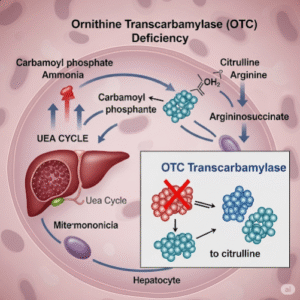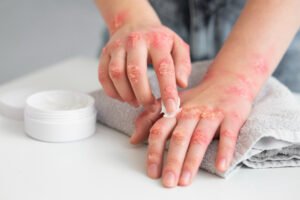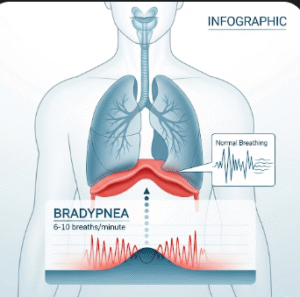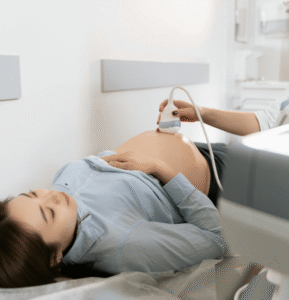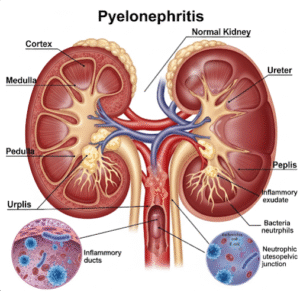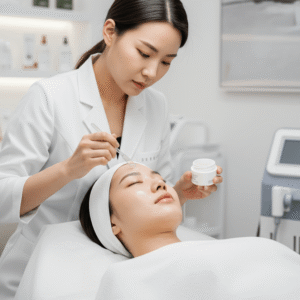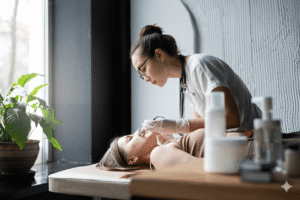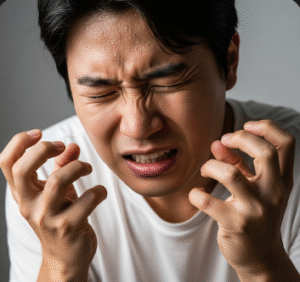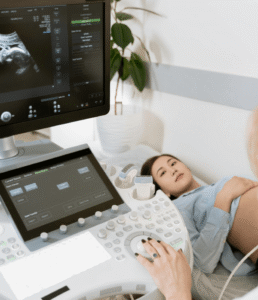Overview
Pemphigus Vulgaris is a rare but serious autoimmune disorder that causes painful blisters and erosions on the skin and mucous membranes, particularly in the mouth, nose, throat, and genitals. It occurs when the immune system mistakenly attacks proteins that hold skin cells together, leading to skin cell separation and blister formation. If left untreated, the condition can be life-threatening due to infections, fluid loss, and complications. With modern immunosuppressive therapies, most patients can achieve disease control and remission.
What is Pemphigus Vulgaris?
Pemphigus Vulgaris is a chronic autoimmune blistering disease in which the immune system produces autoantibodies against desmogleins—proteins that are vital for cell adhesion in the skin’s outer layer (epidermis). This attack causes a breakdown between skin cells (a process called acantholysis), resulting in flaccid, easily ruptured blisters and painful erosions.
This disease primarily affects middle-aged and older adults, though it can occur at any age. It often starts in the oral cavity, where sores or ulcers appear before skin lesions develop.
Symptoms
The symptoms of Pemphigus Vulgaris are typically progressive and include:
- Painful blisters in the mouth, throat, or genital mucosa
- Skin blisters that rupture easily, leaving raw, oozing sores
- Erosions and crusting in the scalp, face, chest, back, or limbs
- Difficulty eating or swallowing due to oral lesions
- Burning or sensitivity on the skin before blisters appear
- Nikolsky sign positive: Skin shears off when slight pressure is applied
The disease often begins in the mouth and spreads to the skin over weeks to months.
Causes
Pemphigus Vulgaris is an autoimmune disorder, meaning the body’s immune system attacks its own tissues. The specific cause is unknown, but several contributing factors include:
- Autoantibodies targeting desmoglein 3 and/or desmoglein 1, which are essential for cell-to-cell adhesion in the skin
- Genetic predisposition, particularly among individuals of Mediterranean, Ashkenazi Jewish, or South Asian descent
- Environmental or drug triggers such as penicillamine, ACE inhibitors, or certain antibiotics
- Stress or illness may trigger or worsen flare-ups
This condition is not contagious.
Risk Factors
Several factors increase the risk of developing Pemphigus Vulgaris:
- Age: Most common in people between 40 and 60 years
- Genetics: Family history of autoimmune disease or ethnic background (e.g., Jewish, Indian, Middle Eastern)
- Use of triggering medications
- Co-existing autoimmune conditions, such as myasthenia gravis or lupus
- Environmental stressors or infections (in some cases)
Complications
Without treatment, Pemphigus Vulgaris can lead to severe and potentially fatal complications:
- Widespread skin infections (including sepsis)
- Dehydration and electrolyte imbalance from fluid loss
- Malnutrition due to painful oral lesions
- Scarring or skin pigment changes
- Side effects from long-term steroid or immunosuppressive therapy (e.g., osteoporosis, diabetes, infections)
- Emotional distress due to chronic pain and appearance
Prompt medical management is essential to reduce complications and improve quality of life.
Prevention
While Pemphigus Vulgaris cannot be completely prevented due to its autoimmune nature, some steps may help reduce flare-ups or support better outcomes:
- Avoid known drug triggers (discuss with your doctor before taking new medications)
- Regular follow-ups with dermatologists or immunologists
- Stress management and healthy lifestyle habits
- Immediate attention to new sores or blisters to catch relapses early
- Good oral hygiene to prevent secondary infections in mouth lesions
- Vaccinations (with medical guidance) to reduce infection risk during immunosuppressive therapy
Treatment Options in Korea
South Korea offers advanced care for autoimmune skin diseases like Pemphigus Vulgaris, with specialized dermatology centers and access to cutting-edge treatments.
Diagnosis Includes:
- Skin biopsy with immunofluorescence testing to detect autoantibodies
- Blood tests to measure circulating anti-desmoglein antibodies
- Clinical examination and medical history review
Medical Treatments:
- Systemic corticosteroids (e.g., prednisone): First-line treatment for inflammation control
- Immunosuppressive drugs: Azathioprine, mycophenolate mofetil, methotrexate
- Biologic therapies:
- Rituximab (anti-CD20 monoclonal antibody): Highly effective in controlling disease activity and inducing remission
- Topical steroids and antiseptic mouthwashes for local symptom relief
- Intravenous Immunoglobulin (IVIG) or plasmapheresis in severe or refractory cases
Supportive Care:
- Nutritional counseling for patients with mouth lesions
- Wound care to prevent infections and speed healing
- Psychological support for chronic illness management
Where to Seek Treatment in Korea:
Top hospitals such as Seoul National University Hospital, Asan Medical Center, Samsung Medical Center, and Catholic University Seoul St. Mary’s Hospital offer expert dermatological and immunological care. Many facilities also offer English-speaking services for international patients and medical tourists.



